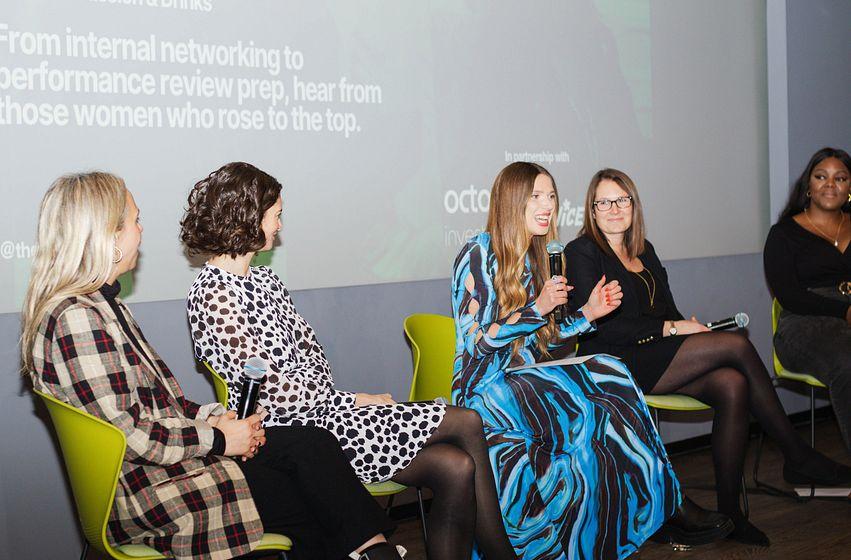nowing how to approach getting promoted is a key conversation when considering the landscape for women’s professional progression in the workplace. In the paper, Potential and the Gender Promotion Gap, researchers discovered that on average, women receive higher performance ratings than their male peers – yet, receive 8.3% lower ratings when it comes to “potential.” This results in a 14% promotion gap, and thousands of women left in mid level-roles.
Securing A Job Promotion: How To Move Up The Career Ladder
In case you missed our expert panel on How To Get Promoted, we are sharing our biggest takeaways from the latest installment in our Stack Career Conversation Series
By The Stack World
That is why in the latest installment of our Stack Career Conversation series, we gathered together an expert panel to discuss this very topic… How Do You Get Promoted?
From understanding the key responsibilities of the role you want, identifying gaps in your skillset to fill, or discovering how to get yourself in front of senior leaders to supercharge your progression, this panel discussion provided invaluable insights on moving upwards. Including, knowing that progression isn’t always linear, as Elizabeth Ogabi put’s it: “Reframing your thinking around what promotion looks like, can actually help you. It's not a ladder, I see it as a career jungle.”
Hosted by Stef-Sword Williams from F^ck being Humble, featuring Leadership & Business coach Anna Woods, Consultant Relationships expert from Octopus Investments Caroline Turner, Entrepreneur and author Elizabeth Ogabi and Rebecca Anderton-Davies who is MD at a prominent bank and author.
With special thank you to our sponsors NICE Drinks and Non-Alcoholic sponsors punchy.
Below are the key notes to take away…
What can you do year-round that works towards that promotion?






Rebecca Anderton Davies: “I used a metaphor to describe this, and not to send shivers down anyone's spine… but it is GCSE maths. You get two out of ten for the right answer and you get eight for showing your workings out. I think so much of progression through career paths is moving from the idea that you can do all this amazing work and say tada look at me… but then everyone is thinking how did you get there? Why was that a problem that we should have been solving?"
Anna Woods: “I think a lot of us, especially as women, shrink a little at the thought of claiming our achievements with our boss. There is a study that shows men at appraisals spend 25% of the time looking back on the year and what they have done, and 75% looking forward. As in: What can I give to the business? What’s my future here? With women it is the reverse, almost justifying why we are there. Remember next time you are in an appraisal, you don’t have to justify everything. Never be afraid to claim and state your ambitions as well, if you don’t tell people they will never know what you want?”
Stef-Sword Williams: “When we are talking about the stuff that you should be doing in advance, the thing that was really common was that you need to be self promoting and advocating for yourself all year round. So, this is not just two weeks before the performance review or two weeks before the interview... this is about making sure you are building the narrative all year round."
Elizabeth Ogabi: “I think something we should be doing year-round is building relationships, especially now that a lot of us work from home. People doubt how much relationships play a part in getting a promotion. The truth is everyone should be doing their job to the best of their ability, but humans like humans and this is bias I know, but it is the reality. In your job you need to be building relationships with your team, your manager and with people in your organisation – show people your enthusiasm.
I'm always working with the C-Suite and I will tell you, they always bring up people's names who are enthusiastic, not who are great at the job, people who are ambitious. They're really looking for people who enjoy working at the company that they're at. It's really important because if one person says your name, and the other person says, who's that, then that could be a problem.”
Caroline Turner: “Something that is absolutely critical and it sounds really straightforward, but you need to understand what the process is to get promoted. Who’s going to be in the room? What are the criteria that they’ll be looking at? If you understand that then you have the framework whereby you know what skills and attributes they are looking for.”
What are the key things employers will be looking at and what do they want to see?






Steph: "One thing I used to do was always ask for the job spec above me – it was really useful because every time I could see that I was moving into that next senior role, I’d start knocking on my boss’s door and say let’s chat because I can see my role is changing. The worst thing is that all of a sudden you’re doing ten different jobs, you should be getting paid ten grand more, and you’ve just not had that time to self reflect."
Elizabeth: “One thing I used to do with my team, and my own line manager is to meet weekly and talk about what we have been working on, or things that we’ve been doing that might not be related to our core goal. I would let them know what I had been doing because just getting to one week before that promotion that you want and saying all that I have done could be a shock. It’s better to build up that momentum over time.”
Anna: “It’s about knowing your audience. Get to know your boss, so the meeting doesn’t feel like a weird thing. Understand your audience, but also know your own dynamics as well as theirs.”
Caroline: “At octopus, we do SDI, which is the sort of the profiling of work styles. If your manager is an analytical person, then go prepared with the numbers, the statistics, what have you done? What have you achieved? If they have a different style, or they have a different value profile, being able to put those same achievements in a slightly different way, depending on who you're talking to, and what they're going to value, can be really helpful in that conversation.”
How do you talk about salary increases?






Elizabeth: “Usually I would find out what other people are earning at a different company to me but in my role. Then I’d think about what I want to earn, and what is realistic. I am a big negotiator, I will push back until it gets to a point where they say this is where we are at.”
Steph: “Hold that space and take the power back. So often in negotiations, interviews, and all these situations, we feel like we're on the backfoot when actually, it's as much about you reviewing this, and I think it's so important to remember that.”
What other things can we be negotiating for in a promotions meeting?
Rebecca: "There are formal moments to flag to people what is important to you and those conversations are key, often your boss can deliver one thing so… is it the pay rise? Is it the new client? Is it relocation to a different country? I know the answer so often is I want everything – but if you had to choose one thing, what is it? Capture that success and then you can work on the other stuff."
Caroline: “You don’t always have to have the whole discussion with your manager. Maybe it is your HR business partner that you could brainstorm with on the expectations, how much is based salary versus bonus, it doesn’t have to be direct, it could be somebody else in the business to give you that sense check.”






Steph: “One thing is to interrogate why you didn’t get that promotion. Ask them, how do you do payment increases? Why has that person gotten a promotion? The more intel you have, the better the decision you can make afterwards. The worst thing is second guessing yourself and thinking it is a you thing, when so often it is a them thing.”
Elizabeth: "There is a lack of women in leadership, so there is a lack of women being promoted. You could really be dealing with bias. I think it is important to understand the industry that you work in and the company that you work for and look around and see what's going on.
Another thing I will add, is that for me personally, when I'm really upset, I tend to write things down. If you know you're going to stay at the company, you don't want to go in everyday being angry. So, I write my feelings down, try to center myself and feel better. If I'm gonna stay, then I set out this is what I'm going to achieve, this is what I'm going to do. If I'm going to leave, this is why I'm going to leave... What you don't want to do is have a bad attitude and leave a bad experience with your line manager.”
Anna: It’s important to remember if things haven’t gone your way, understand that although it can feel intense, there are all the other things that make you happy, all the other things going on in your life.”
How do you deal with the answer being no, not this time around?
With special thank you to our sponsors NICE Drinks.
The Short Stack
In case you missed our expert panel on How To Get Promoted, we are sharing our biggest takeaways from the latest installment in our Stack Career Conversation Series.
By The Stack World
